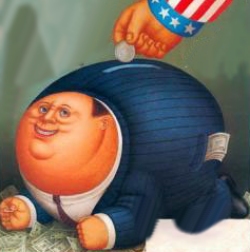 As the Wall Street Journal reports in an article, “The Ethanol Bailout: EPA does the industry another big favor,” the Environmental Protection Agency has stepped in to expand the pork for ethanol producers:
As the Wall Street Journal reports in an article, “The Ethanol Bailout: EPA does the industry another big favor,” the Environmental Protection Agency has stepped in to expand the pork for ethanol producers:
Scenes from a bailout: Last week, the Environmental Protection Agency decided to make the ethanol lobby’s guaranteed “market” even larger. Shares in Archer Daniels Midland, the second largest U.S. ethanol maker, rose to a near 28-month high. Midwest Democrats in tight races got a political bump. Maybe for the first time in history, Exxon and the Natural Resources Defense Council shook out on the same side of an issue�in opposition.
Such wonders were possible because the EPA lifted the cap on how much ethanol is allowed to be mixed into gasoline to meet the annual consumption mandates in the 2007 energy bill, which will rise to 36 billion gallons by 2022. Until last week, this per-gallon ‘blend wall’ stood at 10%, because ethanol is highly corrosive and can damage engines and exhaust systems and impair other features. The practical problem with this industrial planning is that Americans don’t use enough gas to meet the mandates.
So the EPA decided that more ethanol should be mixed with less gas, lifting the cap to 15% for model years 2007 and later, or about one out of seven cars and light trucks currently on the road. The decision came in the nick of time for the ethanol industry, which is at market saturation and producing a glut that the government is not requiring anyone to buy. ‘We have lots of gallons of ethanol chasing too few gallons of gasoline,’ Renewable Fuels Association president Bob Dinneen told the New York Times in May.
Mr. Dinneen was displeased by the EPA’s ruling, even though it is an opening wedge for his larger demands. In a statement, he complained that ‘ethanol producers are hitting an artificial blend wall today.’ You’ve got to love that ‘artificial'”�for a fuel that is more expensive than gas, gets worse mileage than gas, increases carbon emissions more than gas does, and that few consumers would willingly buy unless required by law. . .
For the full article, please click here.